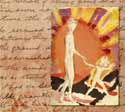 Durtro Jnana issues a remastered, repackaged edition of this hard-to-find album by Current 93, widely acknowledged as one of their finest. Released after the breakthrough apocalyptic folk masterpiece Thunder Perfect Mind, but before the maximalist phantasmagoria of The Inmost Light trilogy, Of Ruine strikes a perfect balance between melody and pscyhedelic experimentation, between lyrical clarity and impenetrable esoterica.
Durtro Jnana issues a remastered, repackaged edition of this hard-to-find album by Current 93, widely acknowledged as one of their finest. Released after the breakthrough apocalyptic folk masterpiece Thunder Perfect Mind, but before the maximalist phantasmagoria of The Inmost Light trilogy, Of Ruine strikes a perfect balance between melody and pscyhedelic experimentation, between lyrical clarity and impenetrable esoterica.
According to David Keenan, author of England's Hidden Reverse, this album is Current 93's best, and listening to it again all these years later, it's hard to disagree. Partly explaining the album's success is its efficient length and linear, narrative trajectory. The liner notes instruct the listener that the album "is to be regarded as one piece," with the track separations representing chapters or sections. Compared to the sprawling double-album that preceded it, Of Ruine is refreshing in its slimness, each track bleeding into the next in a very organic way. Although each track has its own unique melody and atmosphere, the compositional palette across the album remains consistent and minimal: Cashmore's fingerpicked guitar and bass, filled out with Stapleton's psychedelic drones. Only the occasional sprikling of bells or a brief percussive introduction interrupts the album's striking simplicity. Tibet's vocals are occasional joined by Phoebe Cheshire, who opens the album by reading a peculiar quote from British cat artist Louis Wain, a surreal and poetic description of a kitten playing with a ball.
For this album, Tibet and Cashmore drew heavily upon medieval music, directly adapting or drawing inspiration from a suite of liturgical, consort and funeral pieces by composers such as Anthony Holborne, William Lawes and Calum Ruadh. This gives the album a courtliness and melodic coherence that stands out in Current 93's considerable oevre. The production on the album is also first-rate, highlighting each resonant pluck of the guitars, with a canny use of echo and reverb that punctuates the text.
The text itself is one of David Tibet's best, combining the familiar use of mystical Christian metaphors with personal autobiography, which is expanded to encompass England's history, specifically the death of absolute monarchy. For all of its historical and poetic aspirations however, Tibet does not run aground and become the victim of his own complexity and intelligence. To the contrary, the lyrics of this album are probably second only to All the Pretty Little Horses in terms of clarity and relatability. The loose narrative arc relates a tale of existential wandering, a fall into the abyss of melancholy and guilt, and finally a reclamation of innocence and a chance for salvation. This is perhaps a well-worn narrative in the annals of Christian confession, from St. Augustine all the way to Tammy Faye Baker, but this familiarity accounts for its universal nature.
This is probably the last great Current 93 album that desperately needed a reissue: for years the World Serpent edition of the LP and CD have been quite scarce, trading hands for inflated prices of eBay and GEMM. This affordable digipack CD edition on Durtro Jnana is allegedly remastered, although aside from a bit of a volume increase, I could not detect much of a change from the old CD and LP editions in my collection. One big change is the album art, and unfortunately, this is a change very much for the worse. Although the cover is a bit more attractive, the lyrics and liner notes are a real hack job. Some typographical errors were corrected, but I almost couldn't tell, because the booklet is all but unreadable. Instead of the white-on-royal-blue layout of the old booklet, the background has been replaced by what looks to be handwritten text on tea-stained parchment, over which the lyrics are printed in white font. This renders the lyrics extraordinarily difficult to decipher, and for music that is so driven by the strength of text, this is a tragic mistake.
Still, it is wonderful to have this album finally back in print. Even with the artwork, newer fans of Current 93 have ample reason to rejoice. This album not only fills in the missing link between its better-known bookends, but it is also a striking masterpiece of subtlety and restrained beauty.
samples:
- II. Steven and I in the Field of Stars
- IV. "Moonlight," You Will Say
- X. The Great Bloody, Bruised and Silent Veil of the World
Read More

